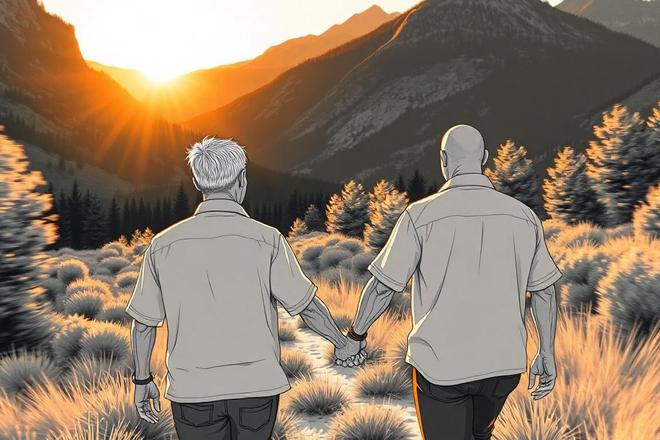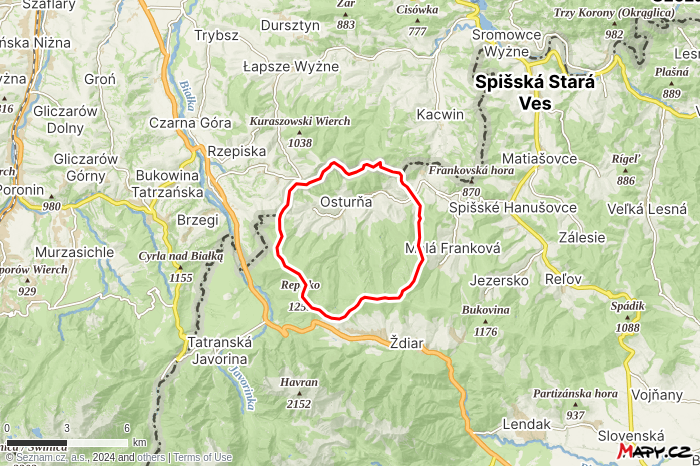Thom Kolton is a retired American entrepreneur who has resided in the village of Osturňa since 2011. He is also a founding member of Bohatstvo Osturne, a civic organization whose mission is to promote Ruthenian and Goral traditions, and to offer opportunities to improve the life skills of residents.
„S kým si sa rozprával?“ – ‘Who were you talking with?’ she asked playfully.
„S mojím priateľom“ – ‘With my boyfriend,’ I replied.
The surgeon had just heard me end a telephone conversation with the words, “I love you.” Believing I was making an amusing grammatical error, she then asked, „Priateľom alebo priateľkou?“ – ‘Boyfriend or girlfriend?’
„S mojím priateľom“ – ‘With my boyfriend,’ I reaffirmed.
And with that, the proverbial cat was out of the bag.
I came out as gay to my friends in the early 1970s at the age of seventeen. When I moved to France in my early twenties and later to New York, my gay lifestyle became completely normalized. I was very open about my life, both socially and professionally. Of course, where I chose to live played a large part in determining my level of openness.
I made several moves during my career, finally settling on Baltimore as my home base. It was also there that I met someone who I decided would be my life partner. Unfortunately, his premature death ended that dream and I found myself alone once again. Instead of jumping back into the dating scene, however, I chose to pursue other interests, including a move to Košice, eastern Slovakia, to study Slovak and the establishment of a language company that I would eventually operate remotely from Kraków, Poland.
While Kraków remains to this day one of my favorite cities, after three years of residency I grew bored. Hoping for a new experience, I moved to my ancestral village of Osturňa, purchased the family homestead, and set up house in the log cabin. I cannot begin to describe the wonderment I felt living in a small Rusyn village in Slovakia and taking part in traditions that I only vaguely recalled from childhood. I had to occasionally pinch myself to make sure I wasn’t dreaming.
I slowly acclimated myself to village life and led a normal, if somewhat hermitic, existence. Eventually, the isolation began to wear me down, and I longed for a romantic relationship. I communicated online with a few potential partners, but I ultimately ended up with only a Finnish pen pal. I was losing hope that I would find someone to spend my life with. I begrudgingly accepted my fate and pursued life as a single person. It was not as though I was living “in the closet”; my nonexistent love life simply never came up in conversation.
I decided to vacation in March on the Dalmatian Coast. After ten years of correspondence, I thought it would be fun to invite my Finnish pen pal to join me. Although we had never met or even spoken with each other, to my surprise we were immediately attracted to each other and fell madly in love, so deeply in fact that I asked him to marry me later that month.
I chose to share news of our engagement with the world through social media and direct messages to my friends. I didn’t know how this news would be accepted. Although many of my friends are sophisticates, others know little outside village life. I was keenly aware that I might lose a few people among whom I counted as friends. After all, Slovakia is not exactly known for its progressive stance on LGBTQ+ issues. But I was mentally prepared.
Of the roughly 50 states within Europe, 22 have legalized same-sex marriage, while 11 others have established civil unions or other forms of legal recognition for same-sex couples. These include 24 out of the 27 EU member states. Slovakia is not included in this list. In fact, Slovakia fares even worse than its neighbors Hungary and Poland, with 63 percent of the population opposing equal rights for queer people. That is certainly a sobering thought for anyone planning to come out as gay, bi, trans, etc. in Slovakia.
In spite of these statistics, my “coming out” to friends and neighbors has been a surprisingly positive experience. While some have been clearly surprised by the announcement, most have been welcoming and congratulatory. One woman, I learned recently, was disappointed by the news only because she had hoped for her own romantic relationship with me. There are probably a few small-minded villagers who delight in gossip about the American who turned gay. But they simply do not matter to me.
It is curious how my positive experience flies in the face of these negative statistics I cite here. Perhaps two older gentlemen are not much of a threat to the world order. Or perhaps Slovak society is changing faster than statistics can record. At the end of the day, the reasons do not matter; I know that my declaration has informed people and moved the societal needle just a little bit further towards progressivism.
My husband flew home over the weekend after staying with me for two weeks. In the check-out line at the grocery store, the cashier looked up at me.
„Kde je váš kamarát?“ – ‘Where is your friend?’ she asked.
„Už išiel domov,“ I responded – ‘He already went home.’
After a pause, I added, „Ale nie je môj kamarát …“ – ‘But he is not my friend…’
The cashier made a slight frown.
„… je to môj manžel,“ I said – ‘… he is my husband.’
„Manžel?“ she questioned – ‘Husband?’
„Áno, môj manžel“ – ‘Yes, my husband.’
She smiled but seemed rather unbothered by the news as she finished scanning my items.
„38,50 €, prosím,“ she said.
I suppose my next step is to hang a rainbow flag and open a gay bar.


 An illustrative image. (source: Freepik)
An illustrative image. (source: Freepik)
